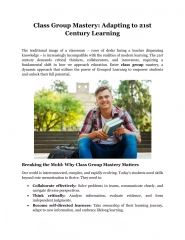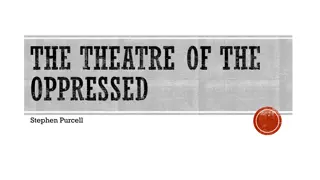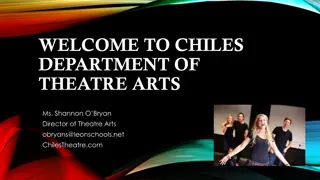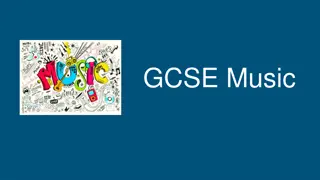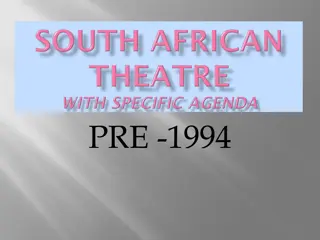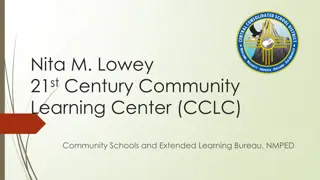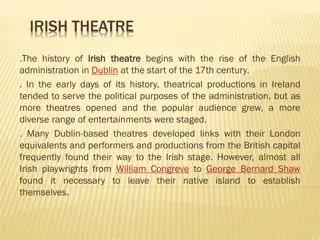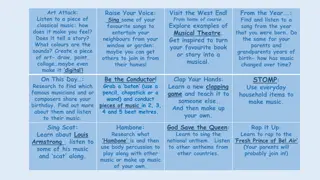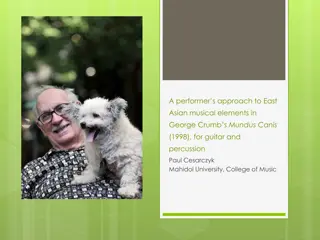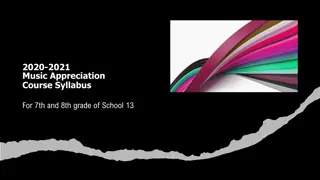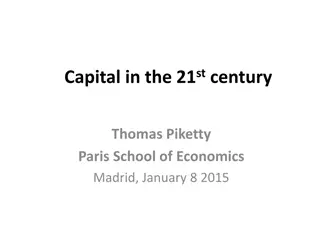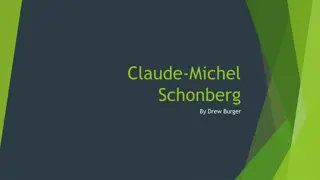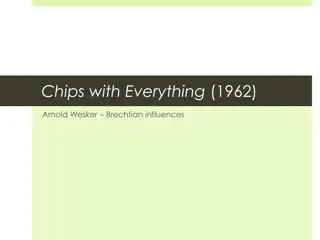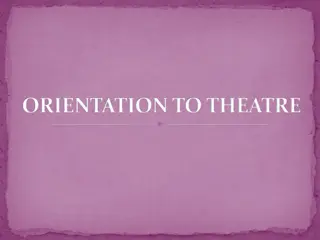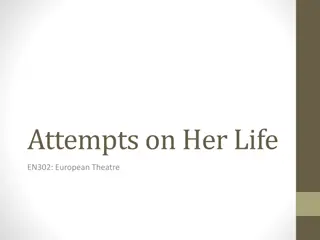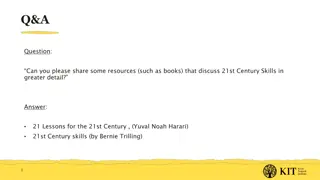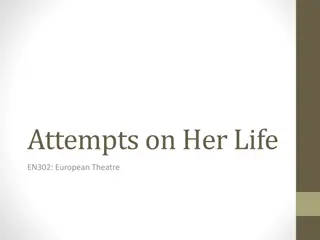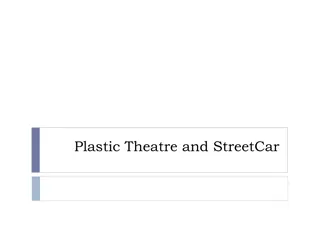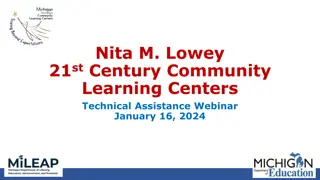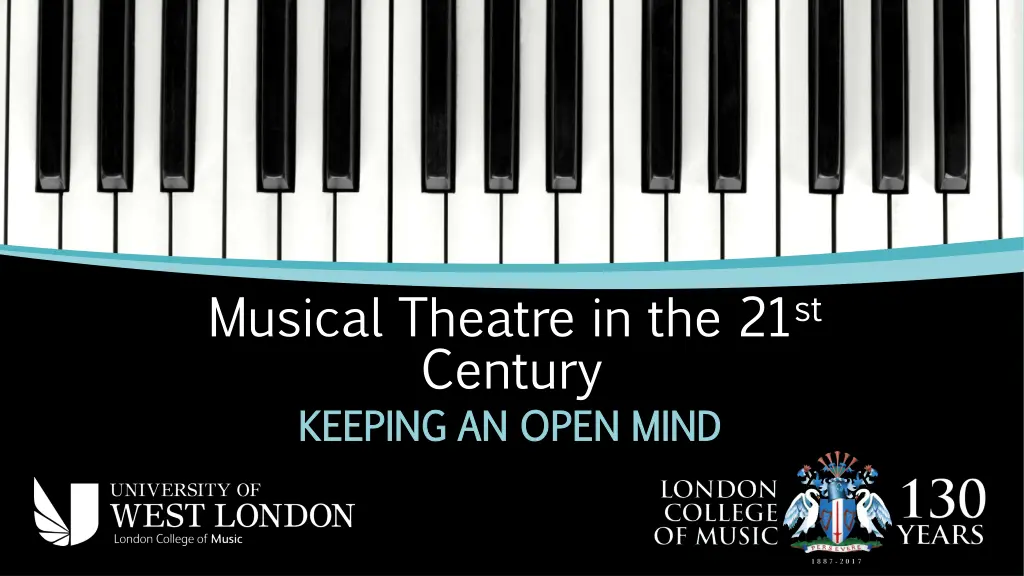
Musical Theatre in the 21st Century: Embracing Change and Challenges
Exploring the state of musical theatre in the 21st century, this content discusses the positives and challenges faced within the industry. From educational opportunities to the lack of arts provision, it delves into the audition process, academic voices, and the need for curriculum evolution. Highlighting both current situations and future considerations, the text emphasizes the importance of adapting to meet the demands of a dynamic industry.
Download Presentation

Please find below an Image/Link to download the presentation.
The content on the website is provided AS IS for your information and personal use only. It may not be sold, licensed, or shared on other websites without obtaining consent from the author. If you encounter any issues during the download, it is possible that the publisher has removed the file from their server.
You are allowed to download the files provided on this website for personal or commercial use, subject to the condition that they are used lawfully. All files are the property of their respective owners.
The content on the website is provided AS IS for your information and personal use only. It may not be sold, licensed, or shared on other websites without obtaining consent from the author.
E N D
Presentation Transcript
Musical Theatre in the 21st Century KEEPING AN OPEN MIND KEEPING AN OPEN MIND
2 The current situationPositives? 6th Form Colleges and Further Education and potential for vocational qualifications GNVQ; BTEC; LCM Grades and Diplomas Stagecoach; Drama schools; Summer Schools; National Youth Music Theatre; Amateur Musical Productions Consider http://www.bluegobo.com/ http://www.bluegobo.com/ - excellent resource for students. Musical theatre performances and extracts The important tutor / examiner who encourages that the dream can be fulfilled confidence realized. Individual speech, instrumental and vocal training.
3 The current situation Lack of Arts provision in the 16-19 curriculum. Current news: cuts for sixth from colleges 3 A Levels not 4. Arts and Languages now in decline The Sixth Form Colleges Association's annual survey suggests two-thirds of colleges have had to drop courses. Over half (58%) have also reduced or removed extra-curricular activities such as music, drama and sport. Desiring this man s art, and that man s scope Desiring this man s art, and that man s scope, , Sonnet 29, William Shakespeare
4 The current situation The arts have become the domain of the privileged few. The dilemma: The dilemma: How does the audition process improve the chances of talented individuals. What are we to look for? No academic qualifications in musical theatre in the secondary sector. (i) Musical theatre lacks a current academic voice to elevate its practices and concerns into the scholarly world of discourse? (ii) Musical theatre is difficult to study outside of the actual experience of it since the performance includes a multiplicity of texts in libretto, music, lyrics, choreography and staging?
5 The current situation Within Higher Education there are also fundamental problems with regard to this curriculum We need to look to the future! We need to look to the future! (i) Tend to preserve the traditions of the past and present texts, styles, methods of acting, singing, theatre design. (ii) Curriculums required to conform to the needs of the commercial industry in order to prepare performers for the workplace e.g. current work in musical theatre. Demand concentrates on revivals, films versions of stage versions and vice versa, writing of JK Rowling and Disney factory. (ii) Experimental theatre often subsumed within the traditional revival .
6. The current situation Product rather than process appears to be the order of the day . Quality of sound often appears to be more important that sense . YouTube, iTunes, CDs, DVDs, Film and internet-based sites encourage imitation and mimicry [negative and positive aspects]. Singing methods and a multiplicity of schools of thinking are crowding the performance industry implications for the individual and the teacher?
7. The current situation Influence of Media The Voice; X Factor; Glee; Let it Shine; BGT; To find a star ALW. Many students have little awareness of the genre in terms of its history and style and the true complexity of the art form: singing, speaking, dancing and staging. Commercial implications make musical theatre difficult to experience e.g. cost of theatre tickets. You have to be talented and multi skilled but also a product as required by the commercial impact of this industry.
8 The transition from one world to the next The water is wide, I cannot get o er, and neither have I wings to fly Factual Information: Approximately 900 - 1,000 applicants for 20 places at Conservatoire and some university departments in Musical Theatre. Where to go? How to get there? How can we make the audition process fair? What are we looking for? Who is looking? Conservatoires / Universities: Different approaches to musical theatre?
9 The musical theatre song is at the centre of the audition (1) Points to consider in the performance of a music theatre song in the Points to consider in the performance of a music theatre song in the AUDITION: AUDITION: Lyrics/text; rhythmic and melodic line. Suitability of text and understanding of vocal range and tessitura; tempo; vocal quality and understanding the accompaniment. We are looking for a potential sense of authenticity which includes style, expression, emotion and storytelling. The performer must invite us into the world of the song. The lyric must inspire and motivate the vocal qualities used and be true to the style .
10 The musical theatre song is at the centre of the audition... (2) Can the performer create an imaginative, magical and exciting performance space? Is there a sense of engagement with the audience are we transported? Does the singer understand the narrative? Does the performance indicate a secure sense of character and situation? Is there a good sense of understanding the lyric/text spoken and sung? Is the overall style and phrasing of the song communicated effectively? Is there evidence of stylistic integrity and intelligence?

